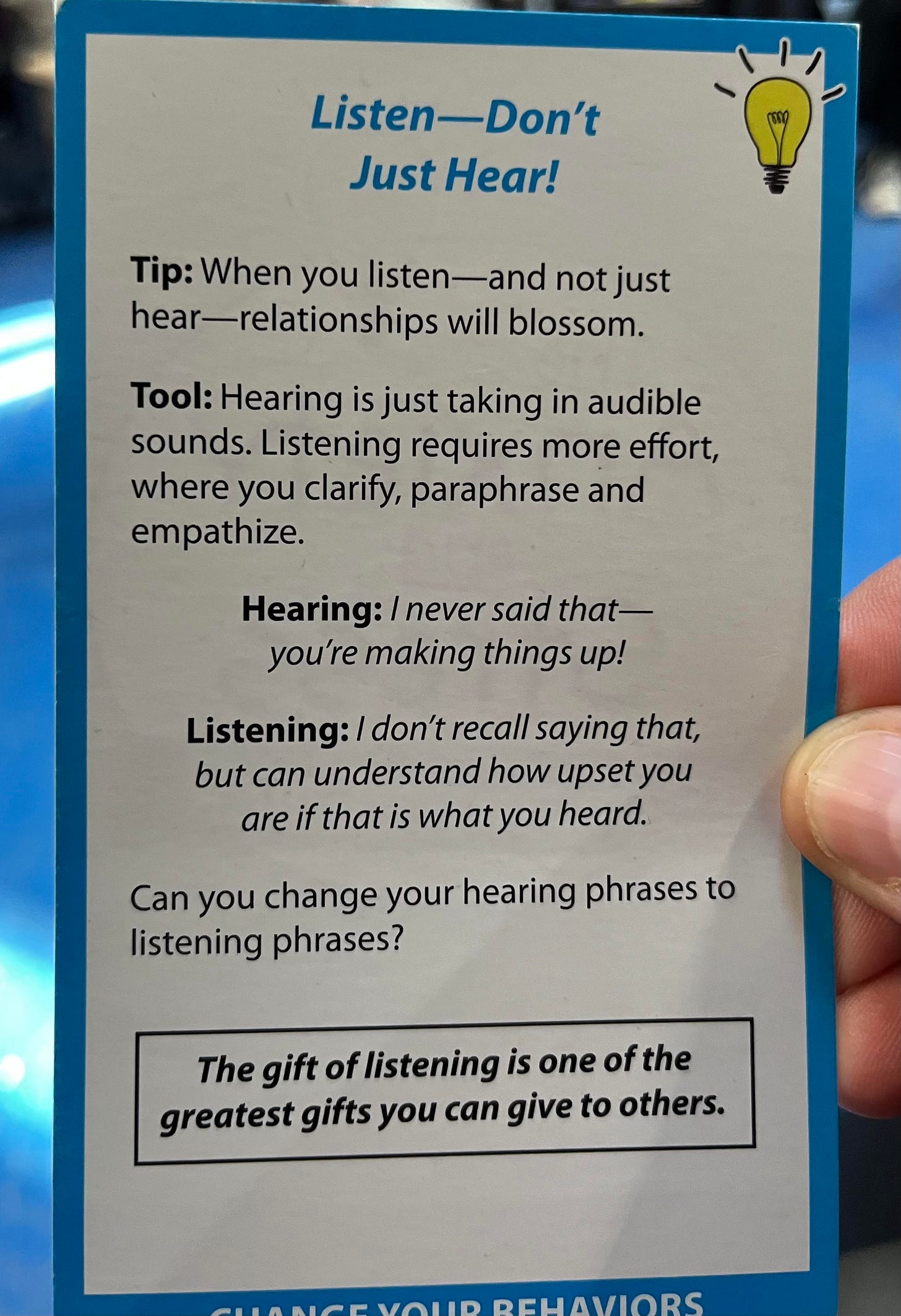Listening, Truth, and the Perils of Humouring People
Musings from the nuthouse
(Audio version here)
I am currently writing from a rather lovely mental health facility where I am addressing the nasty bout of OCD and insomnia that I wrote about a couple of weeks ago. I am much better and by the time I publish, I will be at home. My will to argue passionately for evidence-based epistemology and liberal principles of individual autonomy certainly appears to be back! Today, I found myself incensed by the woolly, epistemological relativism of some cards claiming to use the methods of Cognitive Behavioural Therapy (CBT). I had to register my objection to this only briefly during the group. (I have a tendency to make the therapists tap the “This is not a space for intellectual debate” part of the sign). Nevertheless, I had a lot more to say about the problem with the ‘We should respect that everybody has their own truth” stance in both political and personal communication so my readers will get it. You’re welcome.
This card is a prime example of this kind of thinking.
It’s nonsense, isn’t it? If you don’t recall that you just said a thing I heard you say, there are a few possible explanations for this. You have short-term memory loss or are very stoned and the conversation should be postponed until you regain focus. You misspoke and said something different from what you meant to say without realising that had happened in which case you should try again. I either misheard or misinterpreted what you said and you should repeat it and clarify.
We cannot get anywhere unless we establish what we are actually talking about. Telling me that you understand why I am upset if I heard something different to what you said is a waste of time. Just tell me what you actually meant. Then either I won’t be upset anymore, or if I am, we’ll both know it’s over a belief you genuinely hold, and we can address our differences directly.
This is also, I would argue, important for treating your interlocutor with respect. I certainly would not feel I had been listened to if I was spoken to like this. The only reason I, myself, would speak like this would be in a situation where I needed to soothe somebody who did not have the capacity to use reason. What this card calls ‘listening,’ I would call ‘humouring’ and I find it deeply insulting.
The philosophical position underlying this approach to communication and conflict resolution is that of relativism. It holds that everybody has their own truth. This makes truth subjective rather than something that corresponds with reality. In this model, all personal truths are deemed equally worthy of respect, and to challenge someone else’s is to disrespect their experience and perceptions. Even the individual making a statement is not regarded as the authority on its meaning. If somebody else interprets it as meaning something different, that is just as valid as what it really did mean. This is a well-intentioned but profoundly misguided approach to managing conflict in a situation where different ideas exist. The purpose of it is to stop conflict from arising in the first place by allowing everybody to be right. But when everybody is right, nobody is and this makes conflicts impossible to meaningfully resolve.
This is in stark contrast to the liberal ‘marketplace of ideas’ approach to communication and conflict resolution which is that of evidence-based epistemology, pluralism and individualism. Evidence-based epistemology holds that truth is that which corresponds with reality and the best way of determining what reality is is evidence. Pluralism is, at root, acceptance that within society, different sets of ideas will exist and they will sometimes conflict with or contradict each other. These differences have the right to exist without being coerced into conforming with any orthodoxy. Further, the liberal system regards such viewpoint diversity positively as the fuel for productive and robust debate which produces knowledge, advances moral progress and resolves conflict. It also respects the individual’s right and ability to evaluate different ideas and accept or reject them. This is, in essence, how a marketplace of ideas works. This relies on an expectation that we work through disagreements civilly using evidence and reason. A marketplace of ideas cannot work if everybody expresses their different opinions and we agree that they are all valid to respect each other’s feelings.
As we go through our lives interacting, communicating and negotiating with other humans in our personal, social or professional relationships, we do not typically think of how we navigate this in terms of philosophical concepts like evidence-based epistemology, relativism, pluralism and individualism. Nevertheless, the way we understand truth, navigate differences in ideas and respect (or not) individuals as the authority on their own beliefs and as rational agents capable of evaluating other people’s ideas absolutely affects how we engage with others in all kinds of relationships, contexts and settings.
To genuinely resolve conflict with mutual understanding, we have to recognise truth as ‘that which corresponds with reality’ and reality to exist independent of anyone’s feelings about it. We have to appreciate that people will be coming from different perspectives and try to understand them as they are and see value in that. Whether this conflict is happening in a close personal relationship, a broader social interaction, a professional exchange, an academic forum or a political debate, we need to respect other people as individuals with their own minds, set out our positions clearly using evidence and reason, listen carefully to the other position and argue the problem out.
This is certainly how I endeavour to engage with other people when conflict arises, although I will, on occasions, fail, because I am not a perfectly rational agent consistently capable of calm, reasoned, evidence-based consideration of everybody else’s position. I am a messy human with complicated feelings prone to confirmation bias and motivated reasoning as well as misunderstanding things and simply being wrong. Nevertheless, I would argue that conflict resolution on every level from disagreements within a marriage to political polarisation works better when people recognise truth as something that corresponds with reality and try to engage with the ideas of those they disagree with as they really are than when they do not.
The card is at least right that we should not assume people misunderstanding our position to be dishonest, but we can certainly believe them to be wrong! We don’t have to pretend that we might actually have expressed the stance we are accused of taking but forgotten about it! A bridge-building way to do this is not to take responsibility for the view one does not hold, but be willing to share responsibility for the confusion (even if you suspect it might be deliberate). I find ‘I think we are misunderstanding each other’ to do this job nicely. The assumption of an honest misunderstanding accompanied by a willingness to have a conversation to resolve it frequently defuses hostility and inclines people to want to meet me halfway even if they had been antagonistic to begin with. If, as the card implies, the other person is really speaking to a different viewpoint or attitude that you quite understand their objection to, why not just tell them you share their feelings on the matter straightforwardly and find common ground on that? You can then go on to clarify your own meaning, and understanding and a productive conversation has the chance to result, which it simply cannot do if you instead spend time validating somebody else’s feeling that you said something that you did not.
The biggest criticism I have found most proponents of the relativistic mode of communication to have of the pluralistic, individualistic liberal one is that, while it may allow people to have a variety of opinions, it makes no commitment to respecting them all. This is true and is a feature, not a bug. Nevertheless, some appear to feel it is hostile, confrontational and combative and consequently alienating and divisive. This is not true. Disagreement can be respectful and collaborative and making effort to understand other people’s point of view even when you disagree with it can build bridges. Unfortunately, some people do feel disrespected, unlistened to or even ‘erased’ if others do not agree with them or validate them and instead continue to have their own views which are different. I’d say this attitude is likely to be highly damaging to relationships of all kinds, detrimental to the success of interactions on all levels and catastrophic to one’s personal growth.
I gave a very abridged version of this diatribe in the group therapy session on dealing with anxiety but my will to make it, develop it and apply it to discourse more widely made it quite clear I was ready to come home! Normal service shall now resume.
The Overflowings of a Liberal Brain has over 5000 readers! We are creating a space for liberals who care about what is true on the left, right and centre to come together and talk about how to understand and navigate our current cultural moment with effectiveness and principled consistency.
I think it is important that I keep my writing free. It is paying subscribers who allow me to spend my time writing and keep that writing available to everyone. Currently 3.75% of my readers are paying subscribers. My goal for 2025 is to increase that to 7%. This will enable me to keep doing this full-time into 2026! If you can afford to become a paying subscriber and want to help me do that, thank you! Otherwise, please share!





Helen, your musings are like medicine that help keep me out of the nuthouse.
Hope you are feeling better and resting at home with a nice cup of tea by the time you read this. Take care.